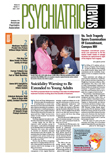Poor sibling relationships in childhood may be an important and specific predictor of major depression in adulthood.
Those relationships appear to be even more crucial in the development of adult depression than the quality of relationships with parents—at least among a cohort included in the long-running Study of Adult Development directed by Robert Waldinger, M.D.
The latest report from that study appeared in the June American Journal of Psychiatry.
Investigators found that poorer relationships with siblings prior to age 20 and a family history of depression independently predicted both the occurrence of major depression and the frequency of use of mood-altering drugs by age 50, even after adjustment for the quality of childhood relationships with parents.
“What's important from our study is the connection there seems to be between being close to at least one sibling and having a lower rate of depression in adulthood,” said Waldinger. “We don't understand why that is the case, but the link seems pretty clear from our data.
“The men who at age 20 had histories of no close relationships with siblings during childhood were much more likely to be depressed over the next 30 years than those who were close to at least one sibling.”
Waldinger is director of the Study of Adult Development at Brigham and Women's Hospital in Boston, and an associate professor of psychiatry at Harvard Medical School.
He said the nature of the association between sibling relationships and depression is unclear. “It could be that closeness with a sibling helps to develop skills in relating to peers that you then take into adult life,” he said. “Or it could be that lack of closeness to siblings in childhood is an early sign of vulnerability to depression.
“We know that strong social connections are good at protecting people from depression and in relieving depression,” Waldinger said.
The Study of Adult Development drew on data collected between 1939 and 1942 on 268 college sophomore men (aged 18-19), along with data collected over the next three decades. The students were selected for study by their university health service because college entrance examinations revealed no mental or physical health problems, and their deans perceived them as likely to become successful adults. Students' parents were interviewed, and extensive family, social, and medical histories were obtained.
It was a uniquely high-functioning cohort: 64 percent eventually obtained graduate degrees, and in adult life most worked as physicians, lawyers, university professors, or business executives.
Of the original group of 268 men in the adult development study, 12 dropped out during college, and eight were killed in World War II. Definitive diagnostic information on the incidence of depression by age 50 was missing for 19 men.
In the current study, data were obtained from interviews with 229 participants and their parents at intake and from follow-up interviews and self-report questionnaires completed by participants at regular intervals. These data were used to rate the quality of relationships with siblings, the quality of parenting received in childhood, and family history of depression, as well as the occurrence by age 50 of major depression, alcoholism, and use of mood-altering drugs (tranquilizers, sleeping pills, and stimulants).
Somewhat of a surprise was the finding that sibling relationships appeared to predict depression but that the quality of parental relationships did not.
Waldinger said the finding might be explained in part by the homogeneity of the study cohort. “Our findings do not imply that parental relationships are unimportant,” he said. “It may be that this group of men had childhood parental relations that didn't range too widely from the best to the worst.
“In a sample where very bad parenting was more common, relationships with parents might also have emerged as a predictor of adult depression,” Waldinger said.
The study was supported by the Borderline Personality Research Foundation.
“Childhood Sibling Relationships as a Predictor of Major Depression in Adulthood: A 30-Year Prospective Study” is posted online at<ajp.psychiatryonline.org> under the June issue. ▪
